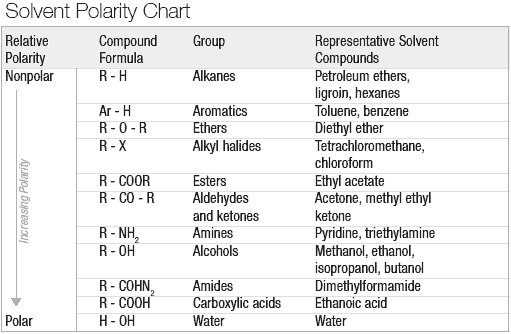06-12-04 18:22
No 513061
I hope this is the right place and I tried the search engine.
I guess this is just knowledge your expected to know - well I dont-
What makes something polar or non-polar ?
also is there a way to tell if something is soluble in something else by looking at the atomic wieght or boiling temp or anything other than just trying it. I know for most of the solubility I can find specifics with the search engine but I would rather know how to tell myself and not use the search engine each time I want to know.
Thank you and
Death to Ewoks
(Chief Bee)
06-12-04 19:59
No 513082
(Rated as: excellent)
also is there a way to tell if something is soluble in something else by looking at the atomic wieght or boiling temp or anything other than just trying it.
You cannot know for sure until you've tried it, but with increasing experience you learn how to judge the approximate polarity of a molecule from its structure (basically by comparing the number of polar functional groups with the overall size of the molecule). The presence of charged or ionizable functional groups, such as -COOH, -NH2 and -SO3H tend to make substances polar and hence more water-soluble - this at the same time as they become less soluble in non-polar solvents (like toluene). The presence of aromatic rings and carbon chains [-CH2-]n tend to make substances insoluble in water and more soluble in non-polar solvents. Another good rule-of-thumb is that the larger a molecule is, the lower will its overall solubility in any solvent be. Small molecules are often freely soluble in (miscible with) medium-polarity solvents like acetone, ethyl acetate and chloroform (these are especially powerful solvents, as their intermediate polarity allows them to dissolve both substances which are more polar as well as less polar than themselves).
What makes something polar or non-polar?
The fundamental reason behind the emergence of the phenomenon, its definition, or its practical implications?

Above you have a polarity chart covering most common common classes of compounds. For the precise polarity index of many common solvents, and a table of which solvents are miscible with each other, see the PDF linked from Post 343523 (Rhodium: "Solvent Miscibility Chart", Newbee Forum)
For further information about the practical merits of choosing solvents of varying polarity, see Post 453146 (Rhodium: "Factors influencing choice of solvent", Newbee Forum)
The very phenomenon which is responsible for making compounds polar or non-polar is if the electron distribution in the molecule is even or not. As you know, electrons carry negative charge, so if one end of a molecule hogs an excess of the electrons in the molecule, it becomes polar due to its uneven distribution of charge. Different atoms have different tendencies to hog electrons (this is called "electronegativity"), so depending on which atoms are part of a molecule, and how they are arranged in space compared to each other, it will become more or less polar.
The technicalities behind this polarization of bonds and molecules can be read here:
Polar Bonds and Electronegativity (http://www.ucdsb.on.ca/tiss/stretton/ch
Molecular Shapes and the Polarity of Molecules (http://www.ucdsb.on.ca/tiss/stretton/ch
Solvents are generally categorized into three main types:
1. polar protic (miscible with water, contains O-H bonds) Ex: Methanol, Ethanol, Isopropanol, Acetic Acid
2. dipolar aprotic (miscible with water, but lacks O-H bonds) Ex: Acetone, DMSO, Acetonitrile, Dimethylformamide (DMF), HMPA
3. non-polar (immiscible with water) Ex: Toluene, Xylene, Dichloromethane, Diethyl Ether, Ethyl Acetate
This is discussed in detail, with many examples, here (http://www.usm.maine.edu/~newton/Chy251
Influence of solvent polarity on reaction rate:
Solvent Effects on Reaction Rates - Comparisons (http://www.chem.ucalgary.ca/courses/351
Solvent Effects on SN2 Reactions (http://www-scf.usc.edu/~chem322a/ppt/Ch
Solvent Effects on SN1 Reactions (http://www-scf.usc.edu/~chem322a/ppt/Ch
Solvent Effects on reaction rates - Solvation (http://chemweb.stanford.edu/winter2003/
The Hive - Clandestine Chemists Without Borders
(Newbee)
06-12-04 20:21
No 513086
I will probably get bad karma for saying this but what the fuck,
Thank you - that is exactly the information I was searching for and explained so it was easily understandable.
You should put this in the stimulants FAQ as I am sure alot of people would find it a usefull refrence.
Thanks again and
Death to Ewoks
(Head Coach)
06-13-04 21:25
No 513259
And don't forget ;-)-->That the idea of solvent polarity refers not to the bonds, nor to molecules, but to the solvent as an assembly of molecules. Qualitatively, polar solvents promote the separation of solute moieties with unlike charges and they make it posssible for solute moieties with like charges to approach each other more closely. Like the concept of electronegativity, the more precise you want the definition of polarity, the harder it is to define. Polarity is thus a ILLDEFINED TERM.
It covers the solvent's overall solvation capability (solvation power) for solutes. The polarity depends on the action of all possible, nonspecific and specific, intermolecular interactions between solute ions or molecules and solvent molecules. It covers electrostatic, directional, inductive, dispersion, and charge-transfer forces, as well as hydrogen bonding forces, but excludes interactions leading to definite chemical alterations of the ions or molecules of the solute. But I'm sure most of you already knew that right ;-). Good Luck and Bee safe. Pyrex out of explanations
Yeah and if ya don't PAID me well, I won't INFORMANT you of the answers you are seeking ;-)